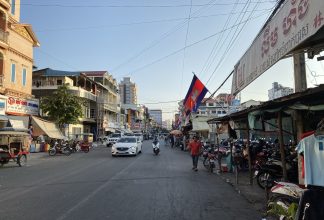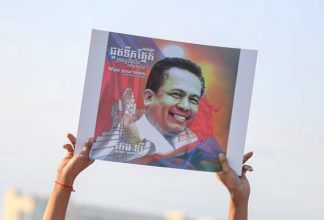Request to Create a Commission of Inquiry into the killing of Kem Ley

In a joint open letter, Civil Rights Defenders and 163 other organisations urge the government of Cambodia to establish an independent and impartial Commission of Inquiry, in line with international standards, into the murder of political analyst Kem Ley.
The letter is issued on the one year anniversary of the brutal murder. Cambodia has witnessed an escalation of attacks on human rights defenders and has a well-documented history of killings with impunity of human rights defenders.
This letter was translated from the Khmer original.
RE: Request to Create a Commission of Inquiry into the killing of Kem Ley
Dear Samdech Kralahom Sar Kheng,
Ahead of the one-year anniversary of the killing of Kem Ley, we, the undersigned, reiterate our concerns regarding the apparent lack of progress in investigating this case, as well as the inadequate investigation and trial of Oeuth Ang, the only person yet convicted or charged in relation to Kem Ley’s death. In light of the inadequacy of the investigation, we urge the Royal Government of Cambodia (“RGC”) to establish an independent and impartial Commission of Inquiry, in line with international standards, to continue the investigation.
On 23 March 2017, immediately following the conviction of Oeuth Ang for the killing of Kem Ley, Oeuth Ang’s lawyer announced that an investigation was ongoing into two persons allegedly linked to the killing – a fact confirmed by the prosecutor Ly Sophana, who reportedly said that the case was split so that Oeuth Ang could be tried while the investigation into the other suspects continued. Oeuth Ang’s lawyer reportedly suggested these persons are ‘Pou Lis’, who, according to Oeuth Ang’s testimony, introduced Oeuth Ang to Kem Ley, and a second man named ‘Chork’, who Oeuth Ang claimed had sold a handgun to him. Moreover, broader questions about the motive for the killing remain unanswered. Despite this, neither the investigating judge nor the RGC have since publicly reported any progress regarding the supposed investigation or its subjects.
The right to life is enshrined in the Cambodian Constitution and binding international human rights law, particularly the International Covenant on Civil and Political Rights, to which Cambodia is a State Party. The duty of states to protect that right to life includes a positive obligation on the RGC to ensure an impartial and thorough investigation into the killing of Kem Ley. The United Nations Principles on the Effective Prevention and Investigation of Extralegal, Arbitrary and Summary Executions (“UN Principles”) clarify how this obligation is to be discharged and explicitly emphasize that states must launch a ‘thorough, prompt and impartial investigation of all suspected cases of extra-legal, arbitrary and summary executions.’ Furthermore, the UN’s Minnesota Protocol on the Investigation of Potentially Unlawful Death (2016) (“the Minnesota Protocol”) sets out the requirement of ‘government verification of the facts and public disclosure of the truth’ where there has been a violation to the right to life, as well as providing that ‘investigative processes and outcomes must be transparent, including through openness to the scrutiny of the general public and of victims’ families.’ The failure of the authorities to publicize information related to the allegedly ongoing investigation in Kem Ley’s case is non-compliant with these standards and gives the strong impression that little progress has been made in the investigation, if such an investigation is occurring at all.
We, the undersigned, also reiterate our concerns regarding the flawed trial of Oeuth Ang. The trial of Oeuth Ang was met with substantial criticism from international observers, who stated that the trial revealed the investigation to be seemingly deficient in several important respects. The alleged motive for the murder, an unpaid debt of $3,000, was rejected by both the widow of Kem Ley, Bou Rachana, and the wife of Oeuth Ang, Hoeum Hout. The credibility of this motive went unchallenged by the prosecution at trial and was not referenced in the trial judgement, while the possibility of further accomplices was not adequately addressed. The role of other actors identifiable in video evidence submitted to the court was apparently not subjected to scrutiny at either investigation or trial. Moreover, following the charging of Oeuth Ang, reports emerged stating that senior district and military officials had a meeting with Oeuth Ang only a week before the killing of Kem Ley. Representatives of the RGC have themselves cast doubt upon both Oeuth Ang’s motive and testimony claiming he was acting alone. These statements and reports, combined with the failure of the prosecution to pursue these lines of questioning at trial, suggests that the investigation and trial may have failed to meet the standards relating to the right to fair trial under domestic and international human rights law.
The RGC must now establish a Commission of Inquiry in order to conduct an independent, impartial, effective and transparent investigation into the killing. Principle 11 of the UN Principles calls for the establishment of a Commission of Inquiry when ‘the established investigative procedures are inadequate because of lack of expertise or impartiality, because of the importance of the matter or because of the apparent existence of a pattern of abuse, and in cases where there are complaints from the family of the victim about these inadequacies.’ The rejection of alleged motives by relatives of both Kem Ley and Oeuth Ang are likely to satisfy the requirement of ‘complaints from the family of the victim’ under the UN Principles. For a Commission of Inquiry to be credible and to satisfy the requirements outlined under the UN Principles, ‘[m]embers of such a commission shall be chosen for their recognized impartiality, competence and independence as individuals. In particular, they shall be independent of any institution, agency or person that may be the subject of the inquiry’.
Given the fact that the killing occurred against a backdrop of escalating attacks on human rights defenders and the political opposition, and in the context of a well-documented history of killings of human rights defenders with impunity in Cambodia, it is imperative that the Commission of Inquiry be staffed by individuals, including legal experts and United Nations human rights officials, with no ties to the RGC.
Following the killing of Kem Ley, five UN human rights experts made similar calls for investigation, stating, “We call for a prompt, thorough and impartial investigation into the crime […] conducted by an independent body with no ties to the government.” The deeply flawed nature of the investigation into the death of Kem Ley has not met international standards or Cambodia’s obligations under binding domestic and international law, and now necessitates the establishment of an independent Commission of Inquiry in order to facilitate justice for the family of the victim.
We, the undersigned, reiterate our concerns regarding the flawed investigation into the killing of Kem Ley and lack of progress in the subsequent investigations into the suspected accomplices to the killing, as well as our demand that the investigation now be taken over by an independent and impartial Commission of Inquiry.
Yours sincerely,
Download the joint open letter to see the full list of signatories and references: Request to Create a Commission of Inquiry into the killing of Kem Ley.


